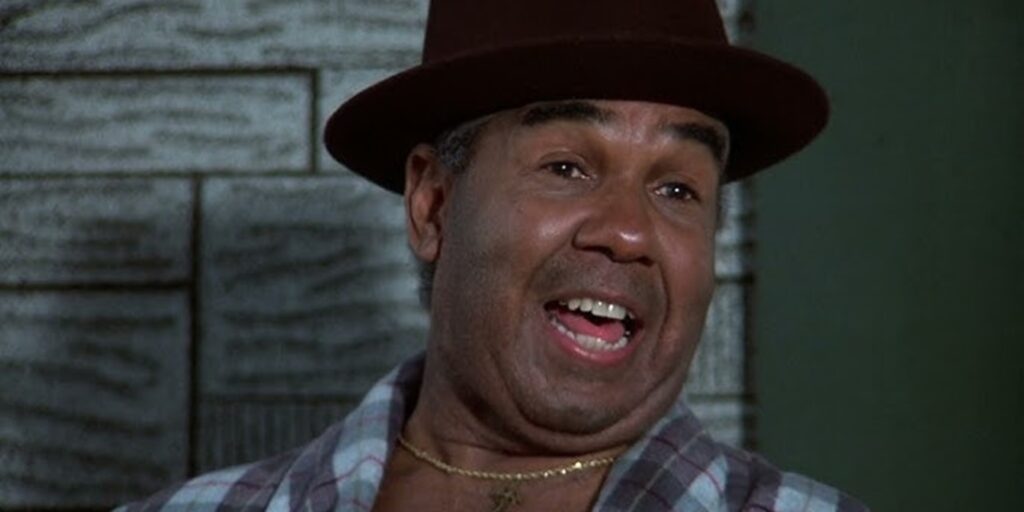
Today, we spotlight a well-written In the Heat of the Night episode that paid homage to the horrific assassination of Medgar Evers.
This is “All the Best Things,” a spotlight on the best TV episodes, movies, albums, etc.
This is a Year of Great TV Episodes, where every day this year, we’ll take a look at great TV episodes. Note that I’m not talking about “Very Special Episodes” or episodes built around gimmicks, but just “normal” episodes of TV shows that are notable only because of how good they are.
All this month, I’ll be spotlighting great Black-centric TV episodes.
In the Heat of the Night was a fascinating series, in that its star, the legendary Carroll O’Connor, as Chief Bill Gillespie, essentially took control of the series after he found the writing not up to his tastes early in the series. The 1988-1995 series, of course, was based on both the novel, In the Heat of the Night, and, more famously, the Academy Award-winning film, In the Heat of the Night (the movie changed some things from the book, and the TV show essentially acted as a direct sequel to the book, just with updating the time to the present day instead of the late 1960s setting of the movie), about the Black Homicide detective, Virgil Tibbs, coming down to Sparta, Misssippi, and striking up an unlikely friendship with the Sparta Chief of Police. Rod Steiger and Sidney Poitier played Gillespie and Gibbs in the original film (which has the iconic line from Tibbs, “Call me MISTER Tibbs”), while O’Connor and Howard Rollins took on the classic roles in this TV series. The idea is that Tibbs comes down to Sparta with his wife for his mother’s funeral, and a local politician decides that since the population of the county is so heavily Black, he could curry favor politically by appointing a Black Chief of Detectives. Of course, this is news to Gillespie, as Sparta doesn’t even HAVE a detective. Gillespie and Tibbs have to now share an office, and Gillespie worries about Tibbs being groomed to replace him as Chief of Police, but at the same time, the two men legitimately like and respect each other. It’s a great dynamic.
In any event, O’Connor felt the first season was too much of a generic cop show, and he wanted to spotlight the town more, and also have more Black actors. Geoffrey Thorne joined as a new Black officer, Willson Sweet, in Season 2. O’Connor wasn’t thrilled with the Season 2 writers, either, and by Season 3, he just took over the showrunning duties on the show himself, hiring writers who he trusted were in sync with his vision of the series. One of those writers was William Royce, who got promoted in Season 4 along with Cynthia Deming, who Royce would often co-write episodes with.
In Season 5’s “Sweet, Sweet Blues” in 1991, Royce wrote (the veteran director Vincent McEveety directed it) a smart homage to the tragic murder of Medgar Evers. Evers, you see, was a civil rights activist in Mississippi who was assassinated in his own driveway in 1963. His murderer was well-known at the time to be Byron De La Beckwith, but all-White juries refused to convict him twice in 1964, and so he was allowed to go free until 1994, when new evidence allowed the successful prosecution of De La Beckwith, and he died in prison in 2001. Bob Dylan’s “Only a Pawn in Their Game” was one of a number of tributes to the tragic murder of Medgar Evers.
In “Sweet, Sweet Blues,” a local blues piano player, Chester “Ches” Collins (played by real life blues icon, Bobby Short), has a song called “The Bad Sweet Blues” (written by O’Connor) about the murder of Sweet’s grandfather, a crime that was never prosecuted because a body was never found (and a White witness said that Louis Sweet disappeared). Collins had witnessed the murder so many years earlier, but felt he couldn’t go to the cops, and so this song was his little piece of rebellion against the miscarriage of justice. Sweet, by this point in the series, was now a sergeant, and he goes to Tibbs, asking to investigate this, and Tibbs gets the approval from Gillespie to do so.
Gillespie interview’s the alleged killer right before he dies, but while he admits that he lied about his alibi at the time, and admits that Sweet WAS murdered, he won’t confess before he dies.
James Best, best known for his comedic villain role of Sheriff Roscoe P. Coltrane on The Dukes of Hazzard, plays an old man, Nathan Bedford, who took part in the killing of Sweet’s grandfather when he was a Deputy (he later became Sheriff), and has been haunted by the murder ever since. He wasn’t a DIRECT participant, but he was there, and he kept quiet over the years (and obviously protected the killers). He has turned to religion, and visits a local park every day to sit and read the Bible.
Eventually, Collins is finally compelled to tell the full story of what he witnessed, and they learn that Bedford was present, and that the body was buried in the woods. Those woods were later developed, and the park that Bedford visits? That’s where Sweet was buried. Sgt. Sweet is able to confront Bedford at the end of the episode, and at least make Bedford feel terrible about himself (Sheriff Nathan Bedford, like Forrest Bedford on I’ll Fly Away, was named after Nathan Bedford Forrest, the first Grand Wizard of the Ku Klux Klan).
The series won the NAACP Image Award for Outstanding Dramatic Series for this season, the first time it won the award. Thorne left the series after Season 6 to pursue a career as an excellent writer in his own right.
Okay, if I’m going to have 320 more of these (and 12 more this month), I could use suggestions, so feel free to email me at brian@poprefs.com!









